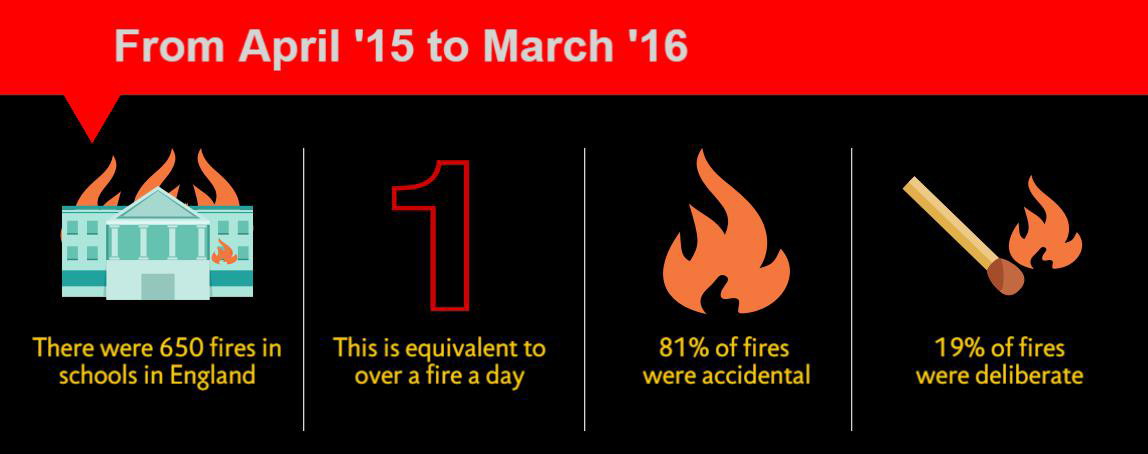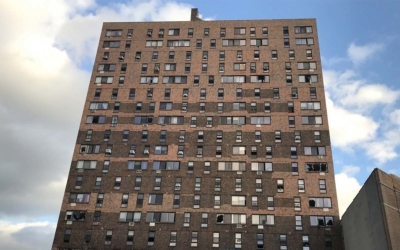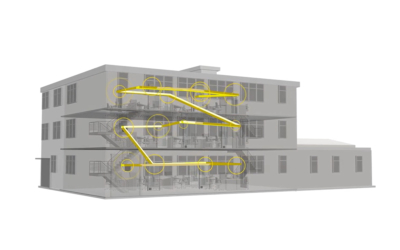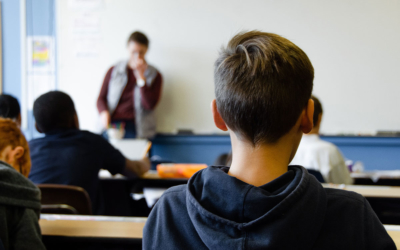The cost of a school fire can be huge. Lives are at risk. Fire damage is not only expensive to repair, it causes disruption and can even affect exam results, and staff and pupil morale.
What measures do schools need to take to minimise the risk of fire, keep everyone safe and comply with fire regulations?
Fire risk assessments
All schools must complete a fire risk assessment. This needs to be updated regularly. Fire risk assessments identify what precautions are needed to prevent fires in schools.
They also need to identify what happens if a fire does break out, and how people can evacuate easily and safely.
You will need to:
- Ensure procedures are in place to reduce the likelihood of fire
- Maintain fire detection and alarm systems
- Ensure staff and pupils are familiar with emergency evacuation procedures.
It is important that:
- Fire risk assessments are kept up to date
- Fire precautions remain current and adequate (they should be reviewed in detail when significant alterations are made to a school’s premises).
Quick tips for fire safety in schools
Day-to-day there are some very simple measures you can take to make sure your school is fire safe, and prevent risk to life and property. Make sure that:
- Fire doors are in good working order
- Evacuation plans are up to date
- Regular fire drills are undertaken
- Means of escape routes are kept clear and have no obstructions
- Fire doors are not wedged open
- Rubbish and waste is removed from the building and stored in secure bins that cannot be accessed by intruders
- High value equipment is out of sight in a locked separate room.
Think about areas might be high risk in your school. Are chemicals stored correctly in the science lab? Is there a procedure to ensure all Bunsen burners are turned off and safely stored? If you have a lighting rig in the hall or drama department, has it been tested to ensure it is safe?
Arson
Arson is the act of intentionally setting fire to buildings, areas, vehicles or any other type of property and is one of the leading causes of school fires.

Merseyside Fire & Rescue Service has recommendations for preventing arson at schools including:
- Maintain an effective intruder alarm system that is connected to a call-monitoring centre.
- Obtain advice on lighting and CCTV from the local Crime Reduction Officer
- Ensure all doors windows and skylights are secure. A nominated person should be responsible for making sure all doors and windows are closed and locked at the end of each day
- Remove graffiti immediately. If it’s left, vandals might start to see the school as a target
- Maintain good relationships with neighbours and encourage them to contact the police if they see anything unusual.
Sprinkler systems
Sprinklers are mandatory in new school buildings in Scotland and Wales but not in England and Northern Ireland.
However the national Fire Chiefs Council has criticised this and recommends that sprinklers are fitted in all new school buildings.
You might also like
Some Of Our Door Closers Are Still Missing.
It’s not easy to write about actual fires. Where lives have actually been lost. It’s a sensitive subject, after all. I don’t enjoy it. No doubt there’ll be some who will (I would say somewhat cynically) assume that, by doing so, one is taking advantage of a tragedy,...
How does the Golden Thread impact my business?
Dame Judith Hackitt suggests that businesses should be more transparent for accountability purposes. This bought about the introduction of the Golden Thread of information. Read our blog to find out more about what it is and how can it help keep your business compliant.
Why ventilation is the secret weapon to keeping schools COVID-secure
In the Government press conference on the 22nd February, it was announced that all schools will reopen on the 8th March and depending on how successful this is in keeping infection cases down, will determine whether we move to the next stage of lockdown easing. In that press conference Sir Patrick Vallance reiterated the measures that help reduce infection in schools.





